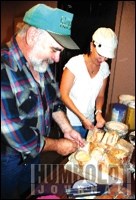The question hung in the air for one, two, three seconds.
"Do any of your classmates make fun of you for coming here?"
Amy Plaquin looked down, suddenly became fascinated by her bowl of apple crisp. Her friend Kiana Thomas answered, but slowly and after a pause.
"Sometimes, yeah," the twelve-year-old said, her bangs peeking out from under a black New York Yankees toque. "People will say, 'Wow, you can't even afford your own food?' It bothers me because they're all rich and don't have to worry about it."
"Here" was Humboldt's only soup kitchen, as busy as it's ever been on a recent Thursday night. Volunteers swarmed throughout the kitchen of the Senior's Hall on 6th Avenue, where a meal is served once a week. They were busy preparing a turkey dinner for 62 people, from newborns to octogenarians.
The soup kitchen has been in operation for over two years and was founded by James Folster with support from Partners Family Services. Folster, with his bushy white beard and hat, is a constant presence. He wanders from table to table, saying hi and checking in with some of the regulars.
On this night it's a big crowd, and that's both a good and a bad thing - good that more people are aware the soup kitchen exists, bad because Folster and his volunteers sometimes get to Wednesday with no idea what they're going to serve the next night.
"We need to be better organized," said Crystal Perkins of Partners. "That's why we're hoping to establish a committee to handle things on a day-to-day basis."
The soup kitchen survives on a knife's edge, completely reliant on donations of food, money and time. The Senior's Hall donates the space but there's no permanent storage available.
"If somebody calls me and says they want to donate a 10-pound bag of potatoes, I don't have anywhere to keep it," Folster said.
To that end, a public meeting will be held on Oct. 30 at 6:30 p.m. at the Senior's Hall. The goal is to establish an independent committee that can manage the kitchen more efficiently than the time-strapped volunteers from Partners can. There are short and long-term goals that include opening the kitchen on more nights of the week and hiring someone to organize everything from volunteers to food to grant applications. For now, though, there are more practical problems.
There were colouring books for the kids, but no crayons. The kitchen also suffers from a lack of visibility. With little to no advertising money, the kitchen has to rely on word-of-mouth.
"I was talking to my neighbour just before I came here," said Brad Lefebvre, a volunteer. "I told him I was going to the soup kitchen and he said, 'What soup kitchen?'"
There is also a stigma associated with using a soup kitchen that keeps some people away.
"I have a friend who I asked to come by but she said no," said Linda Masse, who has been coming to the kitchen with her friend Harvey for the past two months. "A lot of people are too proud to come."
There are others who have no such qualms. They come to share a cup of coffee and a meal with friends. It's a social place as much as anything else - a group of kids play with colouring books around one table (those missing crayons were later donated) while others sit and talk quietly with each other.
Plaquin and Thomas sat together near the back of the room, next to the stage. They did not talk quietly to each other, but giggled and laughed like young girls are wont to do.
As dessert wrapped up and the cleanup began a volunteer holding a plastic bag of leftovers stopped by the table. She handed the bag to Plaquin, who began rummaging through its contents. She pulled out a small container of green olives and turned up her nose.
"Ew," she said, shaking the container and staring suspiciously at the olives. "Ew, ew, ew."




